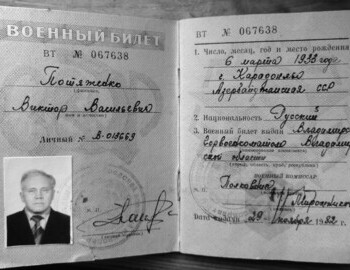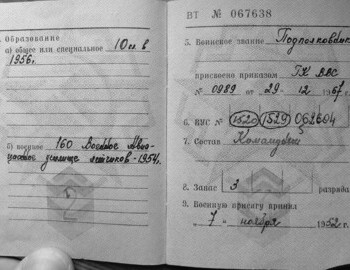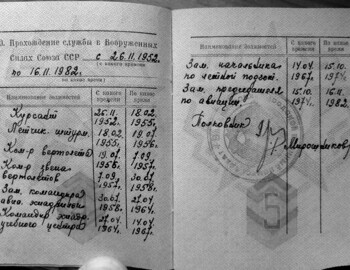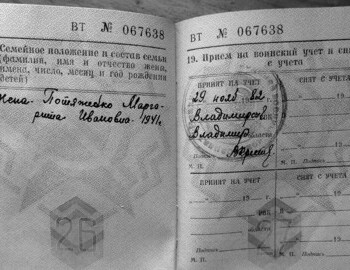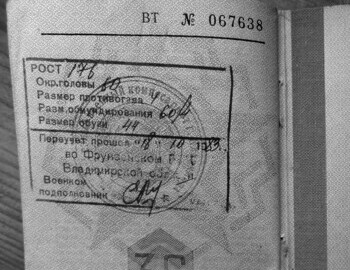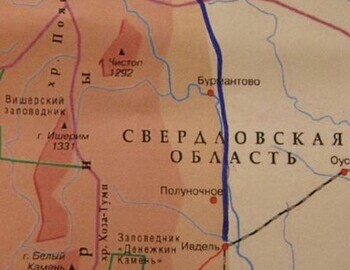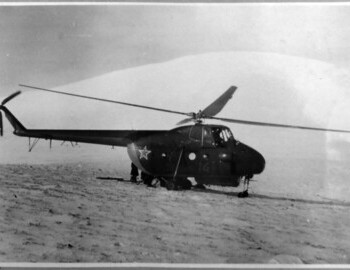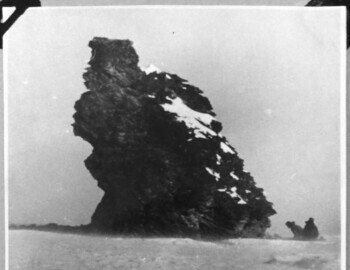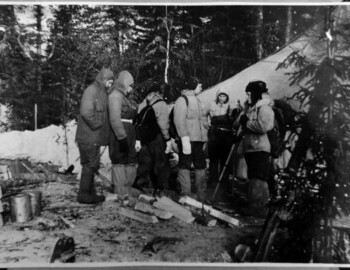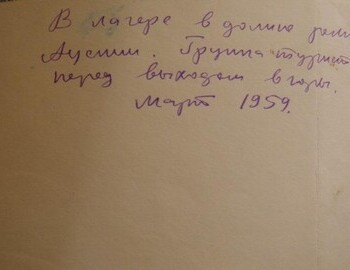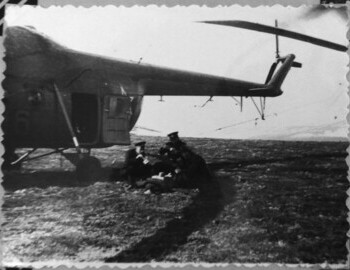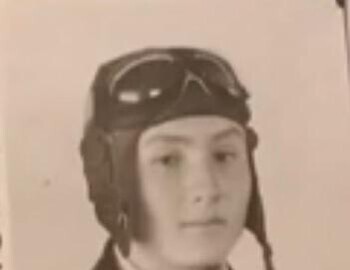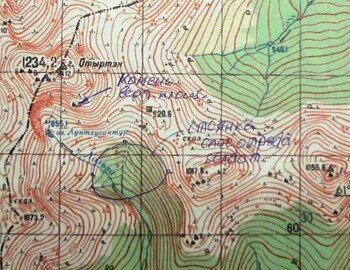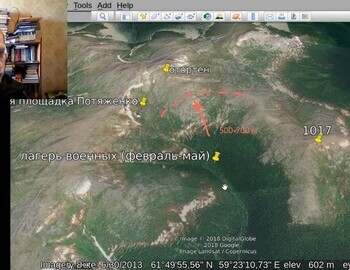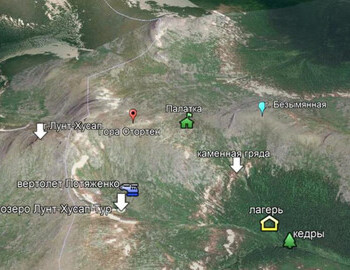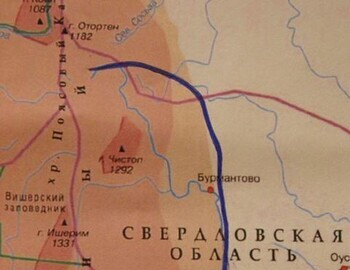
Interview with helicopter pilot Victor Potyazhenko
© NGO "INTERNET CENTER of the Dyatlov group tragedy", 2014 (taina.li)
The text of the conversation on behalf of the "Center for Civil Investigation of the Dyatlov group Tragedy" NAVIG, Konstantin Boreysha (KB) with Victor Vasilyevich Potyazhenko (VP), Margarita Ivanovna Potyazhenko (MI) on the Dyatlov group case on March 15, 2014, city of Vladimir. The text was compiled from video and audio recordings of the conversation. The copyright for the sound recording and this text is owned by: CENTER for Civil Investigation of the Dyatlov group Tragedy, K. Boreysha, V.V. Potyazhenko. The text was written and edited by NAVIG.
KB: Please introduce yourself, where were you born.
VP: I was born on March 6, 1933 in the city of Karadonly of the Azerbaijan USSR, I studied there, the war began and we moved to Krasnodar. In Krasnodar, during the war, I went to school, graduated from the 9th grade, became member in the flying club, flew gliders, a PO-2 aircraft, parachuted, and after completing 2 years of training on a PO-2 aircraft, it was announced that we can go to a military school. Well, I thought, I will go to the military registration and enlistment office and write a statement. Okay, let's go. I thought, usually the pilots for fighters in Armavir were drafted from Krasnodar school. They told me at the military registration and enlistment office: there is a new school for gliders, and that it is a good school. Well, I say, I'll go there. We arrived ... A helicopter like a helicopter, a commission, an exam, I passed everything, enrolled in a group. There were 95 helicopter pilots, only those who flew airplanes and gliders. And those who arrived without serious preparation, those were recruited into another group. They wanted us to finish school in a year, because there was a war in Vietnam and Korea. But they did not have enough helicopters. But helicopters began to arrive and I graduated from college in 2 years. And now we were about 80 people, Zhukov was the Minister of Defense, they were divided into parts. Rank lieutenant. They sent me to the Transcaucasian Military District, Tbilisi, Kellari airfield. The flight crew was all combat, from the front. We were sent to a helicopter regiment, 20 people, a pilot-navigator. After serving 2 years I was sent to Sverdlovsk, Aramil airfield, 30 km from Sverdlovsk. Then it took about six months, night flights. And then 1959, in the month of February after the Armed Forces Day, a holiday, an emergency was declared: to fly the crew to the north of the Urals, beyond Serov. In the morning we gather for a flight, they say, fly to Ivdel. A general, chief of staff of the Gorlachenko District Air Force, will also fly with you. At first he was in the Volga Military District, then he was transferred here. Lieutenant general. I don't remember the middle name.
KB: What rank were you at that time??
VP: Senior lieutenant. Gorlachenko flew on the Yak-12. We flew in together. I got out of the cab and see what it is... tension in the atmosphere, no one says anything... like a tightening hoop... it became uncomfortable. He comes and says: "Here is Comrade Ortyukov and he will command you." Gorlachenko flew off to see the area there...
KB: What date, 24?
VP: 24 or 25, 23 definitely not, we never fly on a holiday.
KB: You flew in Ivdel?
VP: Ivdel.
KB: And what type was the airfield, military?
VP: No, a small civilian airfield. There were AN-2 and Yak-12 planes and one MI-1 civilian.
KB: You flew on the MI-4, and Gorlachenko flew on the Yak-12?
VP: Yak-12.
KB: On whose order did you fly? Was there a special order for you...
VP: Well, I don't know, there should be an order, but usually the operational duty officer gives us the command to fly there and that's it. Once the operative called us, the task was to fly, fly to Kazan or...
KB: And they don't give you any plans?
VP: Fly there, and there will be a task for the flight... Gorlachenko flew in, that it would take an hour or two to fly there, he comes and says: "Here's Colonel Ortyukov". Ortyukov was from the Ural Institute, head or senior teacher of the military department.
KB: This is probably from the polytechnic where they studied.
VP: Gorlachenko said: "You can handle it, make your own decision when to fly, solve all issues with him, I don't need to call." Sat down and flew away. Overnight at the hotel. Ortyukov: "We'll fly with you in the morning." We got up in the morning, had breakfast, Ortyukov had already arrived. He says: "Well, everything is ready now, let's fly there." We arrived at the airfield in Ivdel, checked the weather. The weather was good. We sat down, me and my crew, there were 3 of us, Ortyukov, the investigator, I don't know, or the prosecutor and another man.
MI: And dogs.
KB: Well, this is the first flight, there were no dogs yet, 3 people crew, Ortyukov and ...
VP: He, the investigator, 2 dog trainers, 2 dogs.
KB: Is it the first day, with the dogs?
VP: And another 2-3 people, things, bags, well, they flew along the route, according to the map to this place, the mountain is so flat, you might think that this is a plain...
NN: Did you know why were you going there?
VP: Yes, we were told that a group of students got lost here... and when we flew to the mountain, he said: "There is already some kind of reconnaissance group here."
- 2 -
KB: Someone was already there?
VP: You will have to land there, I say, that's not going to be easy, there are trees under 50 meters, I can’t land there but here is a hard stone, there is a photo, and we flew around the flat place to see what did it look like and there we landed, unloaded, but the dogs didn't want to get out, something happened to them...
KB: This happened on the first flight?
VP: Yes, on the first flight. Ortyukov ordered to transport the cargo down, and now we will fly to see how to land in this place. We took off, I flew over, it is true that they cut down some trees, I thought I could land, the clearance is 25-30 meters, where my helicopter has a swing of 30 meters plus a tail, in general, I need 40 meters. They have to cut a strip of 50-60 meters, I won’t be landing, I’ll hang in the air and thrown the cargo. After the control flight, I tell Ortyukov to give the command what needs to be done. Well, okay, let's do it right... And the radio operator flew with me, in my opinion, he took a small box with a radio station with him. That's all, Ortyukov says: "There is nothing more to do here, you understand where you will fly and where you will land to drop off people, etc." I take off, so I went along the mountain for acceleration and so flew 500-700 meters and gained a height of 50 meters, Ortyukov stands on the steps, the navigator sits next to him, and he stands between us like that, I show him, it looks like something like a tent, but he is without headphones, poles stick out, snow is everywhere, and here something sticks out, I still can’t land here. He says: "No need, they say, we will fly home, and decide tomorrow." Turned around, flew home. I asked: "What will be the task for tomorrow?" Ortyukov: "Get some rest, we will decide tomorrow." In the morning I take several soldiers, in my opinion, they were all in sheepskin coats, 6-7 people. While we slept, he apparently got in touch with this group with the help of the radio operators...
KB: Who were there on location?
VP: When we took off in the direction of the takeoff, there was something below us that looked like the outline of a tent. Ortyukov said that this group got up in the morning, went, found it, yes, it looks like a tent, there are rags hanging there. Ortyukov said, if you see it, don’t go in and simply determine whether it’s a tent or not. And they look: down there the descent goes steep 700 meters 40-50 degrees, they say there are corpses, 3 corpses lie.
KB: They walked or saw?
VP: They saw that it was as bare as a skating rink...
KB: Thus, it turns out that this group that was standing there were students or military?
VP: Soldiers. They went there, found a tent and saw corpses, they did not touch the bodies.
KB: Those. It turns out that they were within sight?
VP: Yes, the weather was good, the ground was absolutely bare, there are no snowdrifts, 50 meters of packed snow, then 50 meters of bare, etc.
VP: We landed, and Ortyukov and the investigator said: we must go there. They went, they didn’t need me, but I was also interested, so I followed them. I was together with him and someone else was with him. No, there were three of them... yes, and even before that, in the morning he said to the investigator: if this is a tent, why did they stick it like a swallow's nest? The investigator says why they put it like that, Dyatlov seemed to be experienced, it seems that he had been to these places more than once...
KB: Did you see any traces of avalanches?
VP: No, there can’t be avalanches there, because the mountain is flat and gently sloping, only then it breaks off and goes steeply...
KB: But there was no snow on a steep section?
VP: There was no snow on the steep, it was blown all the way down. The mountain rises again and forms a ravine and trees grow along there. They approached the tent talking to each other, and I was walking behind. They came closer and said, look, the tent is cut, and for some reason they immediately say cut from the inside, and I went up and saw rags hanging, I looked in: clothes were lying around, felt boots, a sausage, piece of bread and a flask with alcohol. If the fugitives had run away, they would have taken the vodka, they would have taken the money right away, but everything was left behind. We stood, okay, that's all. Yes, there was an investigator with a camera, well, let's go look at the bodies. The investigator says: here is one track, second, third, then they descends further - all 9 tracks.
KB: Did you find all 9 tracks?
VP: Yes, all 9 footprints. Some were barefoot, no one had shoes in my opinion, some were in socks.
KB: Do you see them walking or running? Were the footprints distanced from each other?
VP: They ran because the distance was 1.5 steps. You won't be able to do more than that.
KB: Steep descent…
VP: We approached the corpses: these are our students. You can’t see anything further, there is a lot of snow, then trees. Ortyukov: in all likelihood, they ran downhill, but now we won’t find anything, the day is short, let’s go back, I will instruct the group to search in this direction. And these bodies will be taken away today. Well, the corpses were taken to the helicopter and flew off. That was the first day. I took 3 corpses to the Ivdel airfield.
- 3 -
KB: It was the second day.
VP: Yes, on the first day we flew, looked, and on the second day they took the corpses. Flew away. To Ortyukov: what should I do? Him: There is nothing for you to do. We'll figure it out for ourselves. We sat for 1-2 days, do nothing, we spent a whole week. Then he took another group of soldiers there, but, no, he tells me: we need to make a big stove to heat the tent, even when we were flying there. I say, you need to take a barrel, weld the legs so that it fits into the ground, and so I took this barrel when I brought people. Ortyukov: they cut down a forest of 70 meters for you, land if you can.
KB: Did you fly for the third time already a week or 2 days after the second flight?
VP: After the two flights 2 days have passed. I took a barrel, food, a 8-10 soldiers, dropped them off at the place where I landed on the site, and I'll try to get the stove below. Went, hovered, began to descend ...
KB: Didn't Gorlachenko fly with you?
VP: No, only Ortyukov. He gave the assignments. So, I went to the landing. I'm going down. From a piloting point of view, it is very difficult. I tell the flight engineer, I will not land, as soon as 3-4 meters remain, tell me. 4 meters left. I say: that's it, open the door, I throw out the winch, lowered the barrel, they can't unfasten the hook (carabiner) there, the soldiers obviously don't know. The barrel was dragged back into the cockpit. I went down lower and he threw it away and I landed again on the platform.
KB: Near the rock?
VP: I landed, and they went to pick, and there was so much snow in the hollow, we dug a hole - 3-4 meters. They say we need to bring probes, six meters long. We arrived at the airport. I have maintenance work for which I must fly to the base (Aramil), they will do it there. Ortyukov said: Ok, go. So I went. The commander said: It is complicated. And I was already a flight commander, they gave me 2 helicopters and a group of rescuers, it turned out to be a search and rescue team. I said: I will take the pilots with me and teach them to land in the well (the clearing of cut trees). The commander says: Take them.
KB: Who was the commander?
VP: Squadron leader.
KB: Position, name?
VP: There was a separate mixed aviation squadron of the district and reported directly to the commander of the district. They made a request to us, the planes were IL-14 LI-2 AN-2 YAK-12 PO-2 and helicopters. We were given assignments and we completed them. The squadron commander was lieutenant colonel Zakurdaev. And so we applied for 2 helicopters. I'm on one helicopter, they're on the second. They arrived, and I told Ortyukov that we would fly 2 helicopters. And so I flew there with a cargo, people and pilots. While unloading, I went with the pilots 2 times. Then they boarded their helicopter and flew away.
KB: Do you remember their names?
VP: Misha Novikov, flight navigator pilot, and Babenko (forgot his first name), just a pilot, Senior Lieutenant at the time. They flew home and did not return, and I periodically flew to Aramil to perform routine maintenance but flew back. February, March, April. In April, we flew to the site, and the soldiers say: we have an emergency here, but the lieutenant, the head of the tent, will tell. I don't remember his last name. I went down to the tent and asked what happened here: yes, at night, when they go to bed, they leave someone on duty. And here he sits, heats the stove, reads, and suddenly the sun has risen. It became bright in the tent. He shouted in fright: - "Get up. I left the tent and above me a big "donut" 20-25 meters in diameter hangs..."
KB: Did it looks like an ICBM?
VP: No. It hangs, doesn't fly. And it's silent.
KB: And they all fled in fear?
VP: No, this is a different case.
MI: It was I who was given a radiogram that a rocket landed there and the soldiers all fled.
KB: And what was the date in the radiogram?
MI: 23 or 24 April. And which general was sitting next to me?
VP: Gorlachenko was not there, he wore red stripes.
MI: With red stripes near me, I told him: this is a radiogram, and he says: let's go to Sverdlovsk, I gave it to Sverdlovsk, an hour later the answer came there were no missiles.
KB: Where were you as a radio operator, at what airfield?
MI: In Ivdel.
KB: Margarita Ivanovna, tell us about yourself.
MI: I was born in 1941, in the Sverdlovsk region, Berezovskiy district, village of Krasnoarmeyskiy January 15. My mother was from Belarus. When I finished the courses I was offered to go to Ivdel. Arrived - omly camps around.
- 4 -
KB: And how come a general was sitting next to you?
MI: He was sitting next to me, apparently, he knew the time of communication and approached. I mainly transmitted the weather. Communication was with Uktus.
VP: The main controller was in Uktus and reported on the arrival/departure of aircraft.
KB: But it turns out that you yourself asked about this rocket?
MI: No, I was told by these guys who were on Otorten that a rocket had landed on them.
KB: Those. the group that was on Otorten reported that a rocket had landed.
VP: Yes.
KB: Did you ask Sverdlovsk?
MI: And there came the answer that there was nothing, but the guys fled, and the officers went and collected.
VP: And when I came in, it was April 1st.
KB: But back to the tent. When you approached with the investigator and Ortyukov, was there a light hanging there?
VP: No, there was no light, I couldn't say that. There was a combat leaflet, a piece of paper written "Evening Otorten".
KB: Did you see it yourself?
VP: I saw it myself. It is written what they did and the tasks for tomorrow, in pencil, blue or red, they wrote on their knees, everything was torn, stuck with tea or something else ...
KB: But when they went down, were there branches broken, sticks scattered?
VP: It was in May, May 3-4, they say that all the bodies were found, they are all on the ridge. We went to see what happened there with Ortyukov and the investigator. They dug out all the snow, it was compressed, and there was already water flowing and you can see, they tried to start a fire, either burned or tried to kindle it. Boughs, branches, green needles, the fire was small.
KB: Was it next to the bodies?
VP: When they pulled out (the bodies) next to them was a fire. There was a crown and only the tips can be broken off. An observation, where we stood the snow fell down from the trees, for 15-20 meters, and the pine trees at the top and bottom of the border where it used to be the snow were of a different color: green blue where the snow was, and no color above.
VP: Ortyukov and ... whispering, the students were from the Polytechnic Institute, all studied at the nuclear faculty. And when they were in the tent something happened, they jumped out and ran downhill. Ortyukov says: if they were soldiers and there was a sergeant among them, they would still be alive. The sergeant would have ordered them back to the tent.
KB: And who exactly was it, did you know?
VP: No, I didn’t know anyone, only know Dyatlov by name, that’s all.
NN: Did you see Dyatlov's body?
VP: No, I didn't.
NN: Did you take out 3 corpses?
VP: Once three, then the rest.
NN: Your helicopter was the only one?
VP: Just me, there were no others. Ortyukov says they went home. Flew away. Today we are taking away the corpses, and tomorrow we will pick up the food supplies and other equipment so that it doesn't go to waste.
[A break in the interview]
VP: Ortyukov says... I say, I'll phone you now, I called the district, they said: you can only transport corpses in coffins or boxes or barrels, I forbid you to open them.
NN: And why do you think?
VP: I do not know why. Not allowed by order.
KB: How long did you fly there, was the investigator the same?
VP: The investigator was the same. But I find out that there is still some kind of search group, why I found out, because the soldiers in Ivdel told me: we drank water from the stream where the corpses lay. I think the mountain is descending and the water is not going there in any way, in order to draw water, you have to walk a kilometer, It’s good that it’s not us, but there is some kind of search group.
KB: Perhaps they were students?
VP: I don't know anymore. Nobody talked about students.
KB: Here's another question: have you lost your flashlight?
VP: No, I did not lose and did not find.
End
- 5 -
Additional questions and answers by phone.
1. What kind of military unit was military unit 32979 in Aramil? This is an army unit, its tasks?
NAVIG: Was it military unit 32979 in Aramil?
VP: Yes, military unit 32979.
NAVIG: Was it an army unit?
VP: Yes, this is a military unit, a separate mixed aviation squadron.
NAVIG: What were its tasks?
VP: This is the control squadron of the commander of the district, the North Ural Military District, and carried out all the tasks assigned by the commander.
NAVIG: Is this a regular military unit?
VP: Да, это обычная войсковая часть.
2. What kind of search and rescue unit was organized for its tasks, examples of search at that time.
VP: A year after my transfer, a rescue team was organized. There were 3 helicopters, a communications platoon, 2 therapists, 2 surgeons, a senior doctor, and all sorts of paramedics, orderlies, etc. I had about 100 people.
NAVIG: What was its task in 1959, can you give examples of search and rescue operations?
VP: Our team didn't manage to do anything.
NAVIG: No, but what about others? The incomprehensible term "search and rescue unit", what did it save, what were they looking for?
VP: The tasks were different, for example, during a flood, spring floods there, we had to fly, save people or fires, report about it, demolition work on the ice.
NAVIG: I.e. you worked with civilians?
VP: Not only with military units.
NAVIG: Civilian or military search and rescue?
VP: Only along the military line.
NAVIG: Only if the military got into trouble?
VP: Well, if, of course, there was an accident, then they could help, there may be both military and civilians.
3. What relation in the order of subordination had General Gorlachenko. Did he come from Sverdlovsk or did he serve in military unit 32979?
VP: He was chief of staff of the Air Force of the Ural Military District.
NAVIG: No, when we flew to Ivdel.
VP: He was the senior boss, I don’t know who gave him the command, but apparently he was in charge and flew in to see the territory, the place of work, how dangerous it is, and decide whether I can cope or not.
NAVIG: I.e. did he belong to military unit 32979?
VP: He was highest authority.
NAVIG: No, but you had a unit commander, why didn’t he fly, did a general arrive from Sverdlovsk?
VP: I don't know, this decision was made in the county.
4. What and how did you receive an order to participate in the operation with the Dyatlov group? Who gave you direct orders?
NAVIG: I.e. I wonder why the military was involved in the search, were there also civilian helicopters?
VP: There were such helicopters in Ivdel, but they were engaged in transporting geological parties. You see, it cost a lot.
NAVIG: Who gave you the order?
VP: District Air Force Commander.
NAVIG: I.e. Gorlachenko?
VP: Yes, Gorlachenko.
NAVIG: What about your direct superiors?
VP: Squadron commander, must be done no questions asked.
NAVIG: And the commander of the regiment (unit)?
VP: We didn’t have a regiment commander, we have a separate squadron, it’s like a regiment.
NAVIG: But you obeyed the commander of the unit?
VP: Of course.
NAVIG: Obviously, the unit commander and Gorlachenko have already agreed on your dispatch?
VP: Apparently they agreed. Without a commander, no one would have sent me, of course. Gorlachenko flew in, gave the order to me that we were working and that was it. But then I reported to him when I arrived, what I did and how.
NAVIG: And what did he say, gave any assessment of the events?
VP: Of course he did. He was a squadron commander (note: lieutenant colonel Zakurdaev)
- 6 -
5. Did you sign a non-disclosure about what you saw on the pass, and if so, to whom?
VP: No. I was not asked sign anything.
NAVIG: Didn't you have a conversation from the special department?
VP: No, no one did.
6. Who was in your crew, full name, place of residence now?
NAVIG: Were there three people?
VP: Yes, there were three people in the crew.
NAVIG: By position, who are they?
VP: Well, I am the crew commander, the right pilot is considered the pilot-navigator, and the on-board technician.
NAVIG: Was there a radio operator?
VP: No, there was no radio operator.
NAVIG: Do you remember their names? And where do they live now, maybe we can contact them?
VP: Who lives where, I do not know. I know that some live in the Sverdlovsk region, and Sverdlovsk, but I have already lost contact with them. At first I had a pilot-navigator Mihail Novikov, then for a long time there was a pilot-navigator Valeryan Alekseevich Ovchinnikov, and the on-board technician at the beginning was Poteril(?), I forgot to call him, then Nemyko(v?) Nikolay and the third Kovtun Valentin. Ovchinnikov and Kovtun live in Sumzavod district in Sverdlovsk.
7. Was there weapons on your helicopter and what kind?
VP: There was a machine gun, but it was removed, we flew without it.
8. Did you have weapons while flying?
VP: Yes, we had pistols with us. The first time we flew with guns, and then, in my opinion, we flew without weapons.
9. Who met you in Ivdel: military civilians, from Ivdellag, names?
VP: In Ivdel?
NAVIG: Yes, in Ivdel. To whom and how did you hand over the bodies after bringing them from the mountain?
VP: No one met me, there was Colonel Ortyukov and there he had (Gorno?, Gordo?) for supplies and who they work with there, where did they take them, I don’t know.
NAVIG: I.e. you don't know?
VP: I don't.
NAVIG: They transported them to the Ivdellag zone.
VP: I brought them to the airfield, but I don’t know where were they taken afte that.
NAVIG: There were a lot of people when unloading, Ortyukov and Gorno couldn’t have done it themselves...
VP: No, maybe 10 people came, mostly soldiers came from the guards of the camps. I do not know the military unit of the convoy.
10. What did you call the mountain where you landed, it does not have a name.
NAVIG: You say Otorten everywhere, but this rock was on the nameless mountain, 1079.
VP: I was told to fly to the Otorten area, 12 km away.
NAVIG: In fact, it was not on Otorten itself.
VP: No, in the Otorten area.
NAVIG: Why did you estimate the steepness of the slope at 40-50 degrees?
VP: In my opinion, it was very difficult to land, when the second helicopter arrived, it hover for a while, I told him to fly away from there.
11. Why was there already a search party and their tent there before your first arrival?
VP: I was surprised myself, because they told me that I would (provide, note ed.: an incomprehensible word) there, and then in flight they say that there will be a camp along the way. I said what camp? But we've been here before. And when I arrived, they had already cut down the trees so that I could land there, but it was too narrow. I saw a tent already installed, a big tent.
NAVIG: But did you go down the first day on foot?
VP: No, on the first day I did not go down, because there was a lot of snow, there was a trail and then a steep descent to the tent.
NAVIG: Well, when you first arrived. who was there: soldiers or students?
VP: I can't tell you, because they were all in black sheepskin coats, military. I think there were soldiers.
NAVIG: But you're not sure?
- 7 -
VP: But mostly they were soldiers, because everyone was of the same uniform.
NAVIG: What about earflaps?
VP: Yes, hats with earflaps.
NAVIG: The students had hats.
VP: No, they were soldiers' hats.
NAVIG: How many people were there approximately?
VP: Well, there were probably 15-18 people for sure.
12. It turns out that you found a tent during flight?
VP: Yes, I think so.
NAVIG: Has it not been found before?
VP: There was no mention.
NAVIG: Ortyukov did not say anything that the tent had already been discovered when you drew his attention to the tent below.
VP: No, no one knew.
NAVIG: Those. did he say anything that it was discovered before you?
VP: No, when we flew, he didn’t say anything, absolutely, and then when he arrived at the airfield, he said: what you showed me turned out to be a tent. There the group went and looked and said, yes, the tent is standing, now we will fly there with you and go and check.
NAVIG: Then the question arises, why before your arrival there were people there, if they did not know where the tent was? Why were they stationed there?
VP: This group went to meet with the Dyatlov group. Dyatlov went around in a right circle, adhering, and this group went towards them and made a camp. This is what I think.
NAVIG: According to our information, the students were the first to discover the tent when they were following the tracks, and then everyone was called to this place, to this mountain. It's still unclear why this group was there? Maybe they knew about the death of the Dyatlov group before the search?
VP: No, when I arrived there, no one knew anything yet, in the morning when we arrived, Ortyukov said: they found a tent and for some reason it turned out to be stuck like a swallow's nest, I still thought that it was clinging on the top of the ridge?
NAVIG: The fact if you were the first one to find the tent but there were people (a search group of soldiers) already sent thenthey knew that the students were dead. If there was a man-made accident then the military knew where to created the appearance of a search?
VP: 50 years have passed and am still at lost why it started like this. If they knew exactly where to meet, it remained to climb the mountain and walk half a kilometer and find the tent, but they say that they did not where it was.
NAVIG: When you first arrived, did they already have a big tent?
VP: They had a big tent for 20 people.
NAVIG: And part of the forest was cut down for your landing?
VP: Yes.
NAVIG: Well, it seems to have been done later. I.e. you might have forgotten something. But we have theory that perhaps the tent was moved from one place to another.
13. Who did you communicate with during the flights?
VP: I had radio contact with the Ivdel airfield.
NAVIG: And there who received your messages, your wife?
VP: There was a control tower, there was a flight director, and I kept in touch with him.
14. During the flight, did you notice in the region of the mountain or on its slopes an interruption in the forest cover, a crater, a mountain surface, which could indicate an explosion. Were there clusters of other technicians?
VP: There is nothing, just an ordinary forest.
NAVIG: Maybe you haven't paid attention?
VP: Of course, I didn't look carefully. It was necessary to follow the route and check the time.
15. Did you transport the journalist Grigoriev? Do you know the full names of Korotaev, Yarovoy, Tempalov, Maslennikov, Slobtsov? Did the father of the deceased Slobodin fly with you?
VP: No, I don't remember anyone by name.
16. And Gorlachenko - didn’t he say anything to you or didn't he discuss with anyone the reasons for the death of hikers?
VP: No, he didn't say anything.
End
From Potyazhenko's archive
You can see Potyazhenko's landing site and Syunikaev's unit 6602 camp on these maps. But take a closer look. Potyazhenko drew his landing site on a rock on the steep slope of Otorten. Semiletov and Bobrikov based their maps on the one Potyazhenko drew and gave Kuntsevich, but they moved Potyazhenko's landing site on the Lunthusaptur lake, the first place where a helicopter could have landed south of Otorten. The route on the last (simplified, no contour lines) map is drawn by Potyazhenko himself in 2014 during an interview by Irina. The route is clearly not ending on Otorten but the Dyatlov Pass. In that same interview Irina says that she had given up showing Potyazhenko other maps he can't see well. His sight has not gotten any better in four years when he circled in 2018 where he landed in 1959. Also he had taken picture of the rock where he landed and that is the rock with the monument plaque on the Dyatlov Pass. In another interview by Olga Potyazhenko clearly says that he "landed near a rock on the saddle between Auspiya and Lozva". When Potyazenko was shown a modern photo of Kholat Syakhl and the outlier rock: "here I was sitting (landed near the rock), there is a descent (points south to the Auspiya valley), in this place there was the soldier's camp..." Where did he see the tent of the Dyatlov group, he points to the Kholat Syakhl slope, "700 meters from the rock".

